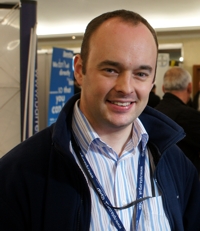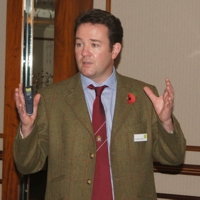There were plenty of other events at PestTech with open sessions on feral bees, fly control on the farm and seagull legislation, whilst CRRU held a special wildlife aware meeting.
The workshop on seagulls and the law attracted a good sized audience, all keen to find out what they can and, just as importantly, what they cannot do, to control these large, noisy and sometimes aggressive birds.
|
Rodney Calvert from Natural England kicked of proceedings. He was standing in for Paul Butt, who was unable to attend this year’s event having recently suffered a heart attack. Paul is well known and highly respected in pest management circles so, we feel sure everyone will want to join us, in wishing Paul a speedy recovery and be pleased to hear that he is doing fine but under strict orders to take it easy for a while. Rodney explained the concept of General Licences which are issued to reduce bureaucracy and allow pest controllers to carry out activities that affect protected species, without the need to apply for a personal licence. They normally run from 1 January to 31 December and are revised annually. For gull management, the licence that applies concerns ‘the preservation of public health and public safety’. He emphasised that Great black-backed gulls (Larus marinus) have been taken off the general licence as there are only around 1500 pairs left in the UK and that for Herring gulls (Larus argentatus) whilst nests and eggs can be destroyed or removed, adult birds must not be killed or removed under the general licence. If such action is necessary a personal licence must be applied for. Pest controllers are responsible for correctly indentifying which species they are dealing with. Whilst the principles are pretty straight forward problems can arise in interpreting what constitutes a public health or safety hazard. For example, as Rodney explained, gull nests could be moved if they were blocking a gas flue or on a school roof but, if there is no threat to public health or safety, then they must not be harmed. Simon Moon from Taunton Dean Borough Council reviewed the major types of gull control methods currently on offer and explained how in his experience using plastic eggs was the most effective method when it came to reducing noise and nuisance behaviour of gulls. Simon also covered the diseases which gulls carry such as Salmonella and Campylobacter and talked about the importance of having an integrated management plan for gull control in city/town centres. |
|
|
|
The afternoon programme included a certificated session on feral bee awareness and treatment run by Tony Baker from Alphakill Pest Control and Iain Turner, representing event organisers” the National Pest Technicians Association (NPTA). This 1.5 hour course covered legislation and the correct procedures to follow. It stressed the need to assess the situation thoroughly before any treatment. Honey bees are beneficial insects and wild bee nests should only be treated if there is a risk to public health and no other alternative remedies arte available. This was followed by a short presentation on fly control on the farm by David Reece and Simon Moseley, of Oakwood Farm Services. The Campaign for Responsible Rodenticide Use (CRRU) held a lunchtime meeting for Wildlife Accredited technicians. There are now around 100 pest controllers who have attended the Wildlife Aware training course and passed the exam to achieve Wildlife Aware status. Click here to read the recent article in Pest issue 17. |
||



